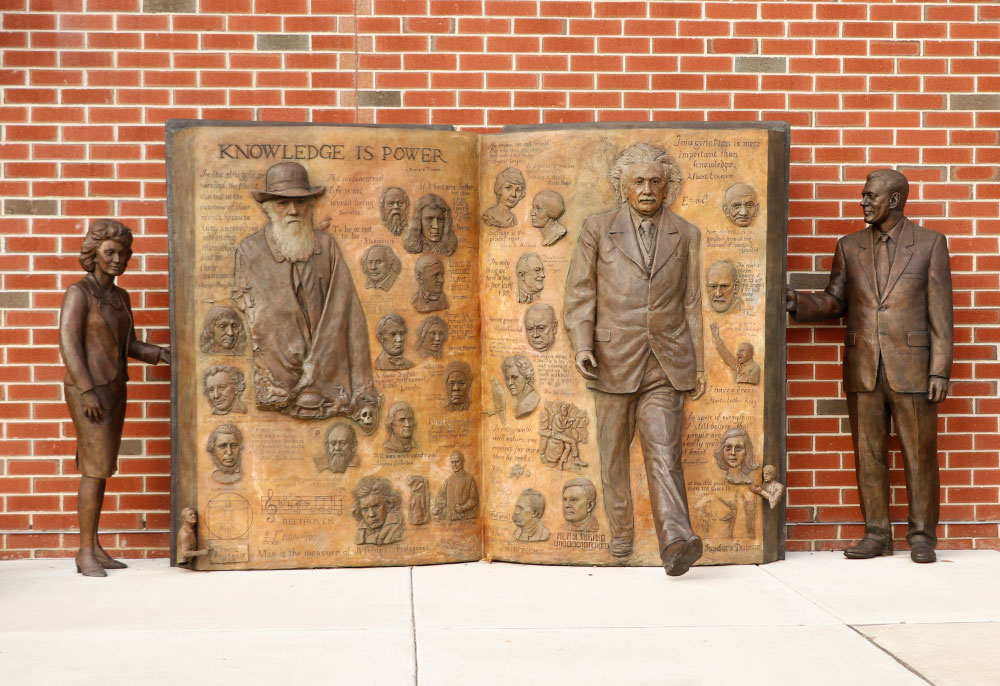Knowledge is Power

Photo By: DSC Staff
Artist: Zenos Frudakis
Materials: Bronze
Dimensions: 8′ by 12′
Location: James Hall
Latitude & Longitude:
39°42’41.1″N 75°07’09.6″W
Knowledge is Power is inspired by a quote by Francis Bacon. In creating a visual representation of the verbal statement, Artist Zenos Frudakis thought a book would make an appropriate metaphor, as it has been the traditional form of preserving and transmitting knowledge through the ages.
Always interested in philosophy and the love of wisdom, Mr. Frudakis wanted this sculpture to embody those who are good examples of having powerful ideas. As a compositional element, he has faces and quotes organized around two central figures he considers two giants of thought. On the left page is Charles Darwin, and those around him are of an earlier period. On the right page is Albert Einstein, surrounded by more contemporary figures.
Darwin is shown with a finch on his shoulder in a moment which helped him gain insight into evolution. Some animals from the islands he visited in the lower part of his cloak include a Galapagos turtle, a seal, and a lizard. Additionally, the cast of a prehistoric child’s skull by its nature reinforces Darwin’s ideas on evolution.
Because of the nature of his groundbreaking work, Einstein is seen stepping out dimensionally as did his ideas about space/time.
In addition to figures and faces, Mr. Frudakis sculpted elements and statements of dance, art, philosophy, poetry, and science.
Two statements contradict two others. This is basic to education: the idea that you study many different thinkers, books, and points of view, then you decide which thoughts are true and relevant to you. On the top left page is the statement “Knowledge is Power,” and on the top right page is the modifying, contrasting statement “Imagination is more important than knowledge.” At the bottom of the left page is Machiavelli’s statement, “The end justifies the means.” Just below that are Emmanuel Kant’s words, “Always treat people as ends never as means.”
The pages of this open book represent the humanist perspective that started when the first philosopher, Thales, began to look for naturalistic answers to questions rather than answers regarding the Olympian gods.
Protagoras’ words, “Man is the measure of all things,” sum up this quest for naturalistic answers. Mr. Frudakis embodied these words in bronze, words that come down to us from a distant past and that in bronze will continue to speak to a distant future.
Artist Zenos Frudakis
Artist Links
- Henry Rowan, 2012
- Knowledge is Power, 2014
- ZenosFrudakis.Com
- Zenos Frudakis’ Portfolio
- Zenos Frudakis’ Process
- Zenos Frudakis’ Resume
Articles and Resources
- Knowledge is Power sculpture elements
- Freedom
- Honoring the Father of American Landscape
- ‘The American Rodin’ in our backyard
- ZenosFrudakis.Com: Knowledge is Power
- From ‘Freedom’ to ‘Knowledge,’ Philly-area sculptor’s work strikes chords around the world
- The United States Air Force Memorial Honor Guard, A Sculpture by Zenos Frudakis
Rowan Library Resources
* May need to log in through Rowan Library to view












